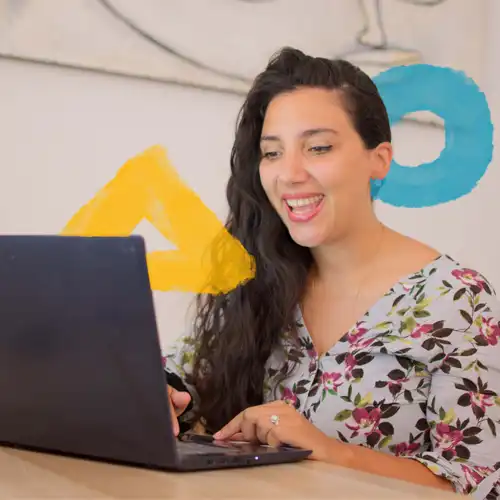
Okay, you decided to hire a French tutor to prep you for your GCSE exams, great ideas. Now how to pick the right one. With countless tutors, spread out on as many websites finding the perfect match can seem hard. In this short article, we’ll show you what to look for in a tutor to make sure they will be able to help you ace those exams.
Clear goals go a long way
First things first, it’s essential to set clear goals. Understanding what you want to achieve with your French GCSE exams will guide your tutor search.
Write down your goals – whether it’s improving your grades, gaining conversational skills, or mastering the art of French grammar. Having a clear vision will make it easier to choose the right tutor. For example, if you are looking to improve your pronunciation, having a native French speaker should be a top quality in your perfect tutor.
In this other post, we’re going through other ways to improve your speaking skills and more ways to prepare for the French GCSE exam efficiently. Okay now know what you want to achieve, now how do you prefer to be taught?
Online vs. Traditional Tutoring: Which One’s Right for You?
When deciding between online and traditional tutoring, it’s essential to weigh the pros and cons of each method.
Online Tutoring:
- Pros: Online tutoring offers unmatched convenience, and flexibility, and often comes at a more budget-friendly price point than traditional options. Learning from the comfort of your own space can enhance your focus and efficiency, as studies have indicated. In addition, online tutoring has been shown to have an outstanding effect on marks even on vulnerable students.
- Cons: However, it may not be the ideal choice for students who are easily distracted or those who struggle with modern technology.
Traditional Tutoring:
- Pros: In-person interactions provide a tutor with the ability to respond to your emotions and body language, making the learning experience more personal.
- Cons: Traditional tutoring can be less convenient and typically carries a higher price tag. Additionally, having someone in your space or traveling to someone else’s location can feel a bit uncomfortable.
Ultimately, the choice between online and traditional tutoring should align with your preferences and learning style.
With this in mind, you should be able to make an educated decision on the style of tutoring you prefer, where should you look for your ideal tutor now?
Regulated Agencies or Online Platforms?
When it comes to choosing a tutor, you’ve got options. Online platforms give you a wide variety of tutors with different backgrounds, experiences, and prices (some super affordable). But here’s the catch – they aren’t all vetted, and there’s no quality guarantee. Plus, the rates can go up after you commit
Now, if you prefer a sure thing, regulated agencies are the way to go. They offer professional tutors with verified track records and fixed prices, plus they often provide backup if your tutor can’t make it. But, your pool of tutors might be smaller and prices higher than some freelancers.
You decide – do you want options or excellence?
At French-GCSE.com, we provide vetted, expert tutors who specialize in helping students excel in their French GCSE exams. Hit us up if you want a free session.

What Reviews Tell You
Start by reading reviews from other students like you. What do they love about the tutor? What teaching style do they prefer? Are they happy with the results?
Look for patterns. If lots of reviews mention the tutor’s super-helpful explanations or their patience, it’s a good sign. But if you see repeated complaints, like being disorganized or always late, you might want to steer clear.
Reading reviews is like a sneak peek into your tutoring future. So, take your time, and trust your gut!
Did you find your perfect tutor? How to make sure
Once you’re all set, go ahead and request a consultation. Most tutors offer the first one for free. During your first meeting, keep it simple. Ask about their teaching experience, their approach, how they track progress, and their schedule. Don’t forget to inquire about any past student success stories. These questions will help you determine if they’re the right fit for you.
Be open about your goals and weaknesses (they might ask anyway). Most importantly, trust your instincts, and watch out for the 5 signs of a bad tutor. Is this the person you’d want to spend 1, 2, or 3 hours a week with until your exam? Will they help you ace it?
If it’s a yes, congratulations! You’ve found your perfect tutor. If not, don’t worry. It’s an important decision and shouldn’t be rushed. You’ll find a better match next time.
eeling a little jittery about that upcoming French-speaking GCSE exam? You’re not alone. The mere thought of speaking a foreign language in front of an examiner can make even the most seasoned students anxious. But don’t fret; we’ve got you covered. With some solid preparation and a few trusty tips, you’ll step into that exam room with the confidence of a native speaker.
Know Your Stuff
Let’s start with the basics. Knowing your stuff might sound obvious, but it’s the foundation of confidence. Make sure you’re well-versed in the topics and grammar that the exam will throw at you. How do you do that? We have a whole guide on how to prepare for French-GCSE effectively.
Embrace Mistakes
Next, let’s get this out in the open: Everyone makes mistakes, even native speakers. During the exam, if you happen to make a little blunder, don’t dwell on it. Keep going! Examiners are more interested in your ability to communicate effectively than in achieving perfection.
Slow and Steady
Nervousness can lead to speaking too quickly. But here’s the catch: Speedy speech can trip you up. Slow down, articulate your words, and pronounce them clearly. Your examiner will appreciate your clarity, and you’ll sound more in control. If nothing comes right away don’t shy away from using French fillers like “bon” or “euh”, this will buy you time while sounding more French.
Smile and Connect
While it’s perfectly normal to feel anxious inside, a warm smile and direct eye contact can help project confidence. Even if your nerves are doing the cha-cha inside, maintain composure. Confidence, like a suit of armor, can positively influence your examiner’s perception.
Practice with a French Native Tutor
Practice makes perfect, as the saying goes. And what better way to practice French than with a native tutor? Some tutors have direct experience with French GCSE and can help you avoid mistakes, add structure to your speaking, and boost your confidence.
We wrote a guide on how to find a tutor that’s right for you, but you can also book a free session with one of our native tutors who specialize in French GCSE prep.
The day of the GCSE Exam
Arrive a bit early to settle your nerves. Take a few deep breaths. You can apply these other tips to keep your cool. Remember, the examiner is there to assist you, not to intimidate you. Relax, be yourself, and give it your best shot, you got it!
Amelie Messaoudi
French Online Tutor
Founder of French-GCSE.com
Founder of TutoringWithAmelie.com

